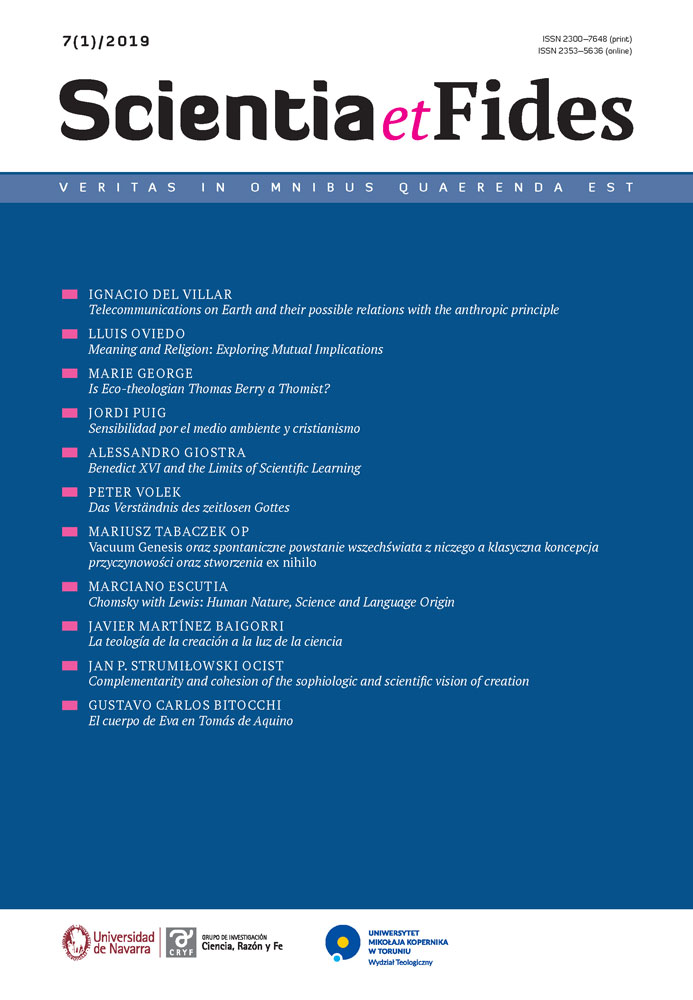Is Eco-theologian Thomas Berry a Thomist?
Keywords
Aquinas, care of creation, ecotheology, environmental ethics.Abstract
I examine the views of the renowned Catholic environmentalist, Thomas Berry, C.P., by comparing them with those of Thomas Aquinas, an author Berry frequently references. I intend to show that while the two share a number of views in common (e.g., both hold that non-rational creatures have their own inherent goodness), ultimately the two diverge on many foundational issues, resulting in differing conclusions as to how we should regard and treat the environment. Aquinas upholds divine transcendence, whereas Berry regards the notion of divine transcendence to lead to the exploitation of creation and locates the divine in the universe itself. Berry accordingly thinks that we should revere all natural things, whereas Aquinas thinks we should revere God and creatures in God’s image. Aquinas maintains that the human soul is created by God and is in God’s image. He sees our rational soul as placing us above other natural things, and from it follows our responsibility to care for nature. Berry, to the contrary, sees this affirmation of discontinuity between humans and the rest of nature to be the root of our environmental woes, as providing a justification for human exploitation of nature. For Berry, humans have no special status, but are one member alongside others in the earth community. Rather than being created by God, “humans have nothing but what they receive from the universe.” By highlighting both the similarities and differences between these authors, I hope to contribute to the project of formulating a sound environmental ethics.References
Aquinas, Thomas. Compendium theologiae. In Corpus Thomisticum, edited by Enrique Alarcón, http://www.corpusthomisticum.org/iopera.html. (All works by Aquinas are from this source.)
Aquinas, Thomas. In Symbolum Apostolorum
Aquinas, Thomas. Quaestio disputata de anima
Aquinas, Thomas. Quaestiones disputatae de veritate
Aquinas, Thomas. Quaestiones disputatae de virtutibus
Aquinas, Thomas. Scriptum super Sententiis
Aquinas, Thomas. Sententia libri Metaphysicae
Aquinas, Thomas. Summa contra Gentiles
Aquinas, Thomas. Summa Theologiae
Aquinas, Thomas. Super Epistolam ad Hebraeos
Aquinas, Thomas. Super Ioannem
Aquinas, Thomas. Super Romanos
Berry, Thomas. 1988. The Dream of the Earth. San Francisco: Sierra Club Books.
Berry, Thomas. 2000. The Great Work: Our Way into the Future. New York: Broadway Books.
Berry, Thomas. 2006. Evening Thoughts: Reflecting on Earth as Sacred Community, edited by Mary Evelyn Tucker. San Francisco: Sierra Club Books.
Berry, Thomas. 2009a. The Christian Future and the Fate of Earth, edited by Mary Evelyn Tucker and John Grim. Maryknoll, NY: Orbis Books.
Berry, Thomas. 2009b. The Sacred Universe: Earth, Spirituality, and Religion in the Twenty-first Century, edited by Mary Evelyn Tucker. New York: Columbia University Press.
Berry, Thomas and Thomas Clarke. 1991. Befriending the Earth: A Theology of Reconciliation Between Humans and the Earth, edited by Stephen Dunn and Anne Lonergan. Mystic, CT: Twenty-Third Publications.
Chapple, Christopher Key. 2011. “Religious Environmentalism: Thomas Berry, the Bishnoi, and Satish Kumar.” Dialog: A Journal of Theology 50:336–343.
Ellard, Peter. 2012. “Not green enough: a response to the green pope and the green patriarch based on the dark green thought of Thomas Berry.” International Journal of Environmental Studies 69:524–539.
George, Marie I. 2012. “Aquinas on the Goodness of Creatures and Man’s Place in the Universe: A Basis for the General Precepts of Environmental Ethics.” The Thomist 76:73–124.
Grim, John and Evelyn Tucker. 2011. “Berry, Thomas.” In New Catholic Encyclopedia Supplement 2011, edited by Robert L. Fastiggi, vol. 1, 87–89. Detroit, MI: Gale.
Grist staff. 2007. “15 Green Religious Leaders.” Access November 12, 2018, http://grist.org/article/religious/.
Laszlo, Ervin and Allan Combs, eds. 2011. Thomas Berry, Dreamer of the Earth: The Spiritual Ecology of the Father of Environmentalism. Rochester, VT: Inner Traditions.
Liddell, Henry and Robert Scott, eds. 1948. A Greek-English Lexicon. Oxford: Clarendon Press, 1948.
Marchant, J. R. V. and Joseph F. Charles, eds. 1953. Cassell’s Latin Dictionary. New York: Funk & Wagnalls.
Scheid, Daniel P. 2011. “Saint Thomas Aquinas, the Thomistic Tradition, and the Cosmic Common Good.” In Green Discipleship, edited by Tobias L. Winright, 129–147. Winona, MN: Anselm Academic.
Spencer, Daniel T. 2017. “Thomas Berry: An Overview of His Work.” Worldviews: Global Religions, Culture & Ecology 21:195–207.
Thomas Berry Foundation. “Thomas Berry: Biography—Awards.” Access November 12, 2018, http://thomasberry.org/life-and-thought/honorary-degrees-awards
Thompson, Christopher, ed. 2012. Aquinas and the Environment Symposium. Nova et Vetera 10:61–277.
Downloads
Published
How to Cite
Issue
Section
License
CC BY ND 4.0. The Creator/Contributor is the Licensor, who grants the Licensee a non-exclusive license to use the Work on the fields indicated in the License Agreement.
- The Licensor grants the Licensee a non-exclusive license to use the Work/related rights item specified in § 1 within the following fields: a) recording of Work/related rights item; b) reproduction (multiplication) of Work/related rights item in print and digital technology (e-book, audiobook); c) placing the copies of the multiplied Work/related rights item on the market; d) entering the Work/related rights item to computer memory; e) distribution of the work in electronic version in the open access form on the basis of Creative Commons license (CC BY-ND 3.0) via the digital platform of the Nicolaus Copernicus University Press and file repository of the Nicolaus Copernicus University.
- Usage of the recorded Work by the Licensee within the above fields is not restricted by time, numbers or territory.
- The Licensor grants the license for the Work/related rights item to the Licensee free of charge and for an unspecified period of time.
FULL TEXT License Agreement
Stats
Number of views and downloads: 455
Number of citations: 2



